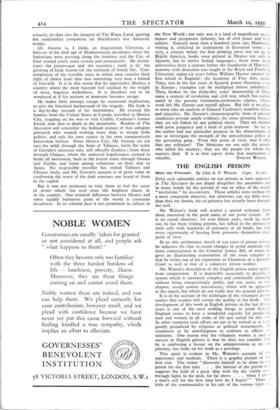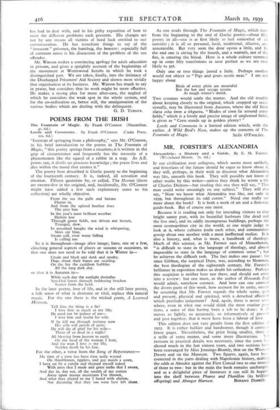THE ENGLISH PRISON'
Meet the Prisoner. By John A. F. Watson. (Cape. 8s. 6d.) EVEN such admirable articles on our prisons as have appeared in The Spectator do not dispel altogether the uneasiness left in many minds by the persual of one or other of the recent " revelations " by ex-convicts. Those articles were written by a most competent observer, but observers can see little more than they are shown, the ex-prisoner has actually been through the mill.
Mr. Watson's book will receive a special welcome from those interested in the good name of our penal system. He is no casual observer: for over fifteen years, week in, week out, he has been visiting prisons, has talked in the privacy of their cells with hundreds of prisoners of all kinds, has had every opportunity of hearing from prisoners themselves their point of view.
In an able preliminary sketch of 15o years of prison refoon he indicates the clue to recent changes in penal methods and those contemplated in the Criminal Justice Bill, of which he gives an illuminating examination all the more valuable in that he writes out of his experience as Chairman of a Juvenile Court as well as that of a voluntary prison worker.
Mr. Watson's description of the English prison today suffers from compression. It is impossible accurately to describe a system which is extremely complex and continually changing without being exasperatingly prolix, and one must, in this chapter, accept certain inaccuracies, which will be apparent to the expert, but which do not really mar the general picture.
It is in the account of the technique of the voluntary prison worker that readers will savour the quality of the book. The development of this work in English prisons in the last fifteen years is one of the most striking things in penal history. England seems to have a wonderful capacity for producing men and women in all ranks of life just suited for this job. Inother countries such efforts are apt to be ruined or at le ist greatly prejudiced by religious or political sectarianism, by crankiness or by unwillingness to conform to official re- strictions. One reason why the voluntary worker is such a success in English prisons is that he does not consider that he is conferring a favour on the administration or on the prisoner, but looks on his work as a privilege.
This spirit is evident in Mr. Watson's account of hls experience and methods. There is a graphic picture of the first visit. The visitor "discovers himself to be alone in Lie prison for the first time . . . the interior of the prison suggests the hold of a great ship with the sky visible onlY through lights in the deck, far far above . . . when I ent.-r a man's cell for the first time how do I begin?" There little of the sentimentalist in his tale of the various types
has had to deal with, and in his pithy exposition of how to meet the different problems each presents. His charges are not by any means all victims of hard luck entitled to our commiseration. He has trenchant things to say of the " innocent " prisoner, the humbug, the boaster: especially full of common sense is his discussion of the problem of the sex offender.
Mr. Watson makes a convincing apology for adult education in prisons, and gives a sprightly account of the beginnings of the movement at Wormwood Scrubs in which he took a distinguished part. We are taken, finally, into the intimacy of the Discharged Prisoners' Aid Society and shown most vividly that organisation at its business. Mr. Watson has much to say in praise, but considers that its work might be more effective. He makes a suong plea for more after-care, the neglect of which he considers the weak spot in the whole system, and for the co-ordination or, better still, the amalgamation of the various bodies which are dealing with the delinquent.
G. D. TURNER.











































 Previous page
Previous page